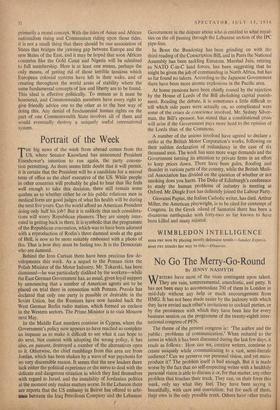Portrait of the Week
rr HE big news of the week from abroad comes from the US, where Senator Knowland has announced President Eisenhower's intention to run again, the party conven- tion permitting. As there seems little doubt that it will permit. it is certain that the President will be a candidate for a second term of office as the chief executive of the US. While people in other countries will probably be glad to hear that Ike feels well enough to take this decision, there still remain some qualms as to whether either he or his public relations men in medical form are good judges of what his health will be during the next five years. Can the world afford an American President doing only half his job? But it is unlikely that such considera- tions will worry Republican planners. They are simply inter- ested in getting back in there. It is symbolic that the programme of the Republican convention, which was to have been adorned with a reproduction of Rodin's three damned souls at the gate of Hell, is now to be more suitably embossed with a photo of Ike. That is how they must be feeling too. It is the Democrats who are damned.
Behind the Iron Curtain there have been precious few de- velopments this week. As a sequel to the Poznan riots the Polish Minister of the Motor Industry, Mr. Tokarski, has been dismissed—he was particularly disliked by the workers—while the East German Government has, as usual, given loyal support by announcing that a number of American agents are to be placed on trial there in connection with Poznan. Pravda has declared that only one party is possible or desirable in the Soviet Union, but the Russians have now handed back the West German Berlin radio station, which formed an enclave in the Western sectors. The Prime Minister is to visit Moscow next May. Government in the dispute about who is entitled to what royal- ties on the oil passing through the Lebanese section of the IPC pipe-line.
In Bonn the Bundestag has been grinding on with the third reading of the Conscription Bill, and in Paris the National Assembly has been tackling Euratom. Marshal Juin, retiring as NATO C-in-C land forces, has been suggesting that he might be given the job of commanding in North Africa, but has so far found no takers. According to the Japanese Government there have been more atomic explosions in the Pacific area.
At home passions have been chiefly, roused by the rejection by the House of Lords of the Bill abolishing capital punish- ment. Reading the debate, it is sometimes a little difficult to tell which side peers were actually on, so complicated were some of the crises de conscience involved. Mr. Sydney Silver- man, the Bill's sponsor, has stated that a constitutional crisis will arise if the Government pays more heed to the opinion of the Lords than of the Commons.
A number of the unions involved have agreed to declare a strike at the British Motor Corporation's works, following on their sudden declaration of redundancy in the case of six thousand men. The week has seen more wage demands and the Government turning its attention to private firms in an effort to keep prices down. There have been gales, flooding and thunder in various parts of the country, while the British Medi- cal Association has divided on the question of whether or not smoking does you harm. The Duke of Edinburgh's conference to study the human problems of industry is meeting at Oxford. Mr. Dingle Foot has definitely joined the Labour Party.
Giovanni Papini, the Italian Catholic writer, has died. Arthur Miller, the American playwright, is to be cited for contempt of Congress. In the Greek island of Santorini there has been a disastrous earthquake with forty-two so far known to have been killed and many injured.


































 Previous page
Previous page